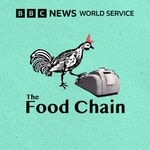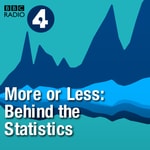The Food Chain – Details, episodes & analysis
Podcast details
Technical and general information from the podcast's RSS feed.

The Food Chain
BBC World Service
Frequency: 1 episode/8d. Total Eps: 501

The Food Chain examines the business, science and cultural significance of food, and what it takes to put food on your plate.
Recent rankings
Latest chart positions across Apple Podcasts and Spotify rankings.
Apple Podcasts
🇨🇦 Canada - food
28/07/2025#13🇬🇧 Great Britain - food
28/07/2025#10🇬🇧 Great Britain - arts
28/07/2025#50🇩🇪 Germany - food
28/07/2025#59🇺🇸 USA - food
28/07/2025#29🇫🇷 France - food
28/07/2025#11🇨🇦 Canada - food
27/07/2025#24🇬🇧 Great Britain - food
27/07/2025#10🇬🇧 Great Britain - arts
27/07/2025#70🇩🇪 Germany - food
27/07/2025#54
Spotify
No recent rankings available
Shared links between episodes and podcasts
Links found in episode descriptions and other podcasts that share them.
See all- https://www.bbc.co.uk/actionline/
17 shares
- https://www.bbc.co.uk/actionline
10 shares
RSS feed quality and score
Technical evaluation of the podcast's RSS feed quality and structure.
See allScore global : 43%
Publication history
Monthly episode publishing history over the past years.
How risky is drinking alcohol?
mercredi 28 août 2024 • Duration 30:52
If you’re a light or moderate drinker, the World Health Organization wants you to know that no level of alcohol is safe for your health.
But just how big is that risk and might it be one you’re willing to take? And what happened to the idea that a glass of red wine might be good for you?
In this programme Ruth Alexander finds out about the studies the guidance has been based on, and the statistical risk of dying from alcohol-related disease.
Dr Tim Stockwell, Scientist at the Canadian Institute for Substance Use Research, is the author of a meta-analysis of 107 studies that look at the links between ill health and alcohol. Professor Sir David Spiegelhalter is Emeritus Professor of Statistics at the University of Cambridge in the UK, he explains how we can make sense of risk as individuals.
And Anna Tait in the UK, Amelie Hauenstein in Germany, David Matayabas in the US and Bill Quinn in Australia talk about how much alcohol they drink, and what moderation looks like to them.
Presented by Ruth Alexander.
Produced by Beatrice Pickup.
(image: four hands raising pints of beer in a ‘cheers’ gesture. Credit: Getty Images/BBC)
What does collagen do for you?
mercredi 21 août 2024 • Duration 26:28
Is it worth taking collagen? With cosmetic companies and A-listers claiming it can slow the effects of ageing, the market for collagen supplements is booming. How sure is the science though?
Ruth Alexander speaks to experts about what we do and don’t know about what these powders, gels and capsules are doing inside our bodies.
She hears from a personal trainer and runner in her 50s about why she takes it daily, and speaks to the CEO of a company selling collagen products in this increasingly competitive market.
New avenues of research are opening up as well, with sports scientists investigating whether an increase in collagen production can help athletes recover from injury more quickly.
If you would like to get in touch with the show, please email: [email protected]
Presenter: Ruth Alexander
Producer: Hannah Bewley
(Image: A serving of supplement powder. Credit: Getty Images)
Food double-acts: Couples
mercredi 19 juin 2024 • Duration 29:29
What’s it like spending 24 hours a day together? Ruth Alexander speaks to couples who run restaurants. She hears how they met, what they argue about and why being a couple might be good for business.
Ruth visits Andrea Follador and Jazz Navin at ‘The Perfect Match’ restaurant in Sale, in the North West of England. Jazz is the chef and Andrea is the sommelier, the two met working at Gordan Ramsay’s ‘The Savoy Grill’ in London. Ruth speaks to Francisco Araya and Fernanda Guerrero, chefs who have lived and worked together in their native Chile, China, and now Singapore where they run fine dining ‘Araya’ restaurant. Rita Sodi and wife Jody Williams ran a restaurant each, and then decided to open one together, 'Via Carota' in New York, United States. Today they run five bars and restaurants together in the city.
If you would like to get in touch with the show please email [email protected].
Presented by Ruth Alexander.
Produced by Beatrice Pickup.
(Image: Andrea Follador and Jazz Navin who run ‘The Perfect Match’ restaurant together in North West England. Credit: BBC)
Who owns seeds?
mercredi 28 septembre 2022 • Duration 28:52
Today’s seed industry is dominated by a handful of companies. Approximately 60% of the market is controlled by just four companies.
Many of the seeds planted by farmers are controlled by international property rights or patents, that limit how they can be used. Court cases have centred around whether farmers have the right to save and reuse seeds for future harvests.
In this programme we’ll chart the history of the seed industry, from the 19th century, when the United States government sent seeds in the post to farmers for free, to the growth of genetics in the 20th century which set the foundations for today’s market.
Ruth Alexander is joined by Courtney Fullilove, Associate Professor of History at Wesleyan University in Connecticut, United States, and author of ‘Profit of the Earth: the global seeds of American Agriculture'; Frank Terhorst, Head of Strategy and Sustainability in the Crop Sciences Division of Bayer Global, the biggest seed company in the world; Michael Fakhri, the United Nation’s Special Rapporteur on the right to food, and Professor at the Oregon University School of Law in the United States; and Dr Tamene Yohannes, from the Ethiopian Biodiversity Institute in Ethiopia, which works with community seed banks around the country.
Presented by Ruth Alexander.
Produced by Beatrice Pickup.
(Image: a man holding a pile of seeds in two hands. Credit: Getty/BBC)
Food for mood
mercredi 21 septembre 2022 • Duration 30:33
Mental health is a hugely complex issue with many causes. There’s no simple answer, then, when it comes to therapies for conditions like anxiety and depression. But a growing body of research is now supporting a connection between nutrition and mental health - that what you eat can have a role to play in reducing symptoms of depression and anxiety.
It’s an emerging field, but dietary recommendations for patients are already being made in clinical settings. Jordan Dunbar explores the scientific evidence for this, and what a ‘happier diet’ might look like.
He speaks to Professor Felice Jacka, Director of the Food and Mood Centre at Deakin University in Australia; US psychiatrist Dr Emily Deans; UK-based chef, Daniel Edwards, and nutritionist Dr Nada Benajiba, who’s based in Saudi Arabia.
If you've been affected by the content of this programme, information and support is available via the BBC Action Line. Go to https://www.bbc.co.uk/actionline
If you would like to get in touch with the show, please email: [email protected]
(Picture: Woman holding a pot of mixed berries. Credit: Getty/BBC)
Producer: Elisabeth Mahy
The flavourists
mercredi 14 septembre 2022 • Duration 28:26
Meet the flavourists – the people who bring together art and science to create the flavours in our food. Each crisp, soft drink, or toothpaste flavour has been concocted by someone in a lab who has spent years studying why things taste good.
In this programme, Ruth Alexander visits the International Flavour Research Centre at the University of Nottingham in the UK, where flavour chemist Professor Ian Fisk demonstrates machines that can act as an artificial nose and tongue. Historian Dr Nadia Berenstein explains how this profession began and evolved alongside the boom in consumer goods in the 20th century. And we meet a master flavourist at the top of their field – Yukiko Ando Ovesen from Japan, who works for the international flavour and fragrance firm, Firmenich.
Presented by Ruth Alexander
Produced by Beatrice Pickup
(Image: girl eating doughnut with brightly coloured sprinkles. Credit: Getty/BBC)
Inside food safety scares
mercredi 7 septembre 2022 • Duration 29:40
Food contamination is a serious public health problem around the world. The World Health Organisation estimates that 600 million – almost 1 in 10 people in the world – fall ill after eating contaminated food and 420,000 die every year.
In this episode, Ruth Alexander speaks to some of the people whose lives have been shaped by serious food safety breaches and how they are working to ensure food safety and strengthen our food systems.
She speaks to US food policy campaigner, Darin Detwiler, whose son Riley died following an E. coli outbreak in 1993, food safety consultant Lone Jespersen, and Tina Potter, head of incidents at the Food Standards Agency for England, Wales and Northern Ireland.
If you would like to get in touch with the show, please email: [email protected]
(Picture: Scientist inspecting meat sample in laboratory. Credit: Getty/BBC)
Producer: Elisabeth Mahy
Tomorrow’s food crops
mercredi 31 août 2022 • Duration 29:01
Climate change means that, in many parts of the world, the way we farm is no longer working.
We need a larger, more diverse range of crops that perform even when the rains don’t come or, as can also be the case, when too much rain comes.
Currently, just 15 crops make up 90% of our energy intake, according to the United Nations’ Food and Agriculture Organization.
In this programme, we’re meeting people who are trying to develop food crops that might thrive in our changing world.
Ruth Alexander visits the Millennium Seed Bank ran by the Royal Botanic Gardens Kew in the UK, where Dr Chris Cockel explains their work collecting and storing seeds from the wild relatives of our staple crops. Tessa Peters, Director of Crop Stewardship at The Land Institute in Kansas, US, makes the case for creating perennial versions of our crops, in order to preserve soil health. And Dr Rebbie Harawa, regional director, Eastern and Southern Africa at the International Crops Research Institute for the Semi Arid-Tropics talks about why a currently underutilised crop – millet – could be help struggling farmers in dry areas. Picture: Close up of millet growing in a field; Credit: BBC/Getty
Running a restaurant with your relatives
mercredi 24 août 2022 • Duration 28:13
Running a restaurant is hard enough, but what if there’s family involved? In this episode, Felicity Hannah explores the highs and the lows of family-run eateries; their history, food culture, family dynamics and how they deal with the cut and thrust of business.
She heads to Liverpool in the UK, to Europe’s oldest Chinatown, where she meets Terry and Theresa Lim, the owners of the city’s oldest Chinese restaurant. And she pays a visit to a local Italian establishment, to meet brother and sister Paolo and Maria Cillo who, with their other siblings and extended family, are building a burgeoning family food empire in the city.
It’s an interesting time for these two restaurants. Italian and Chinese are two of the most exported cuisines in the world, but with growing competition from other popular food cultures, as well as global economic challenges, how are they adapting to changing times?
If you would like to get in touch with the show, please email: [email protected]
(Picture: Paolo and Maria Cillo, and Terry and Theresa Lim with their daughter and two grandchildren. Credit: BBC)
Liquid gold: The price of cooking oil
mercredi 17 août 2022 • Duration 27:06
Vegetable oil is one of many foods that has seen big price rises in the last year.
Not only is it used for cooking and frying, but it’s also in many processed foods such as ready meals, sauces and even desserts.
Ukraine and Russia represent the majority of the world’s sunflower oil production, whilst unpredictable weather, poor harvests and lack of labour have led to higher prices in palm, soybean and rape seed oil at the same time.
In this programme we hear from food businesses struggling with the price of oil, starting with street food traders in Delhi, India. Felicity Hannah is joined by Kathryn Robinson, Head of Development at FBDC, a UK based company that helps food businesses reformulate their recipes; David Laborde, a French analyst at the International Food Policy Research Institute based in Washington DC, and David Wagner, Executive Chef at the City Line Bar and Grill Restaurant in Albany, New York.
Presented by Felicity Hannah.
Produced by Beatrice Pickup.
Additional reporting by Anish Ahluwalia.
(Image: chips cooking in oil in a deep fat fryer. Credit: Getty)









